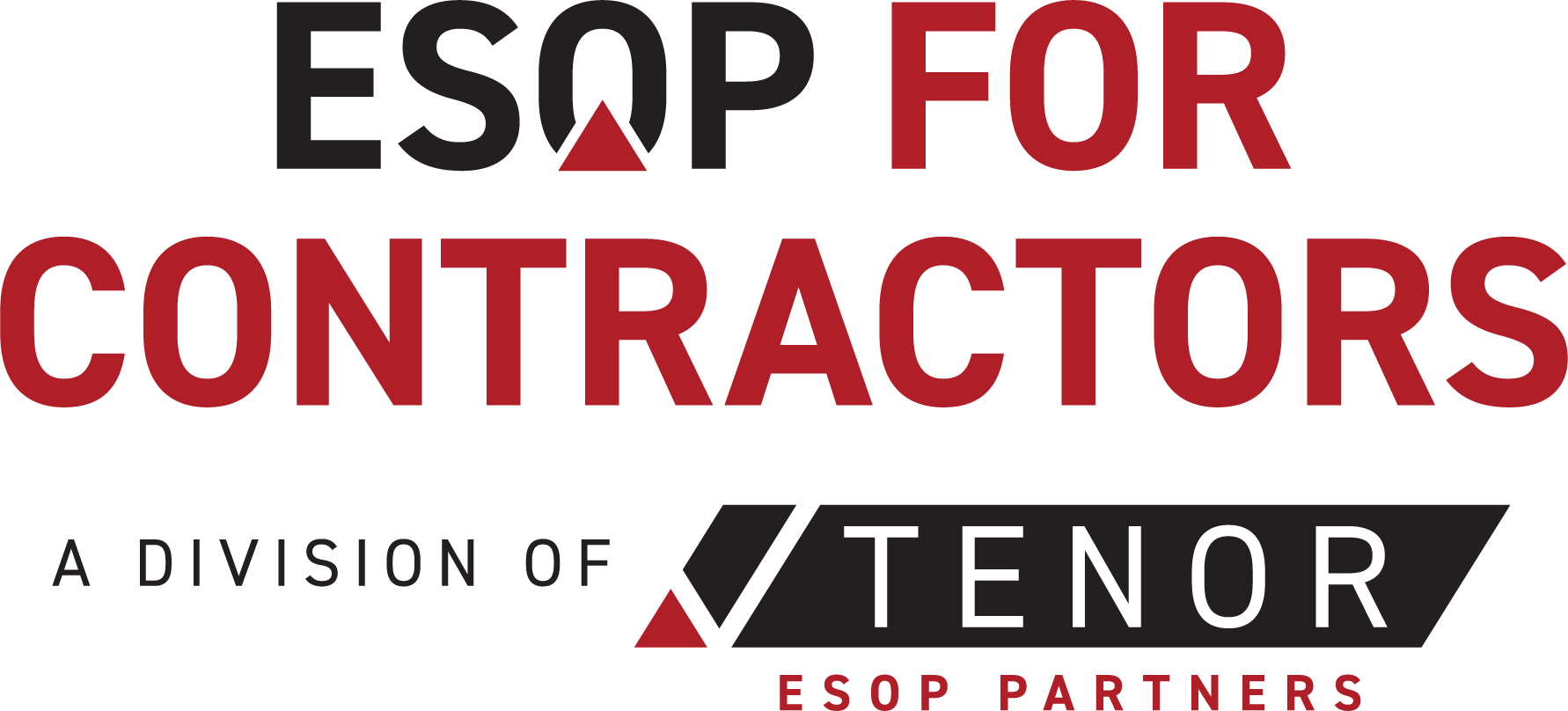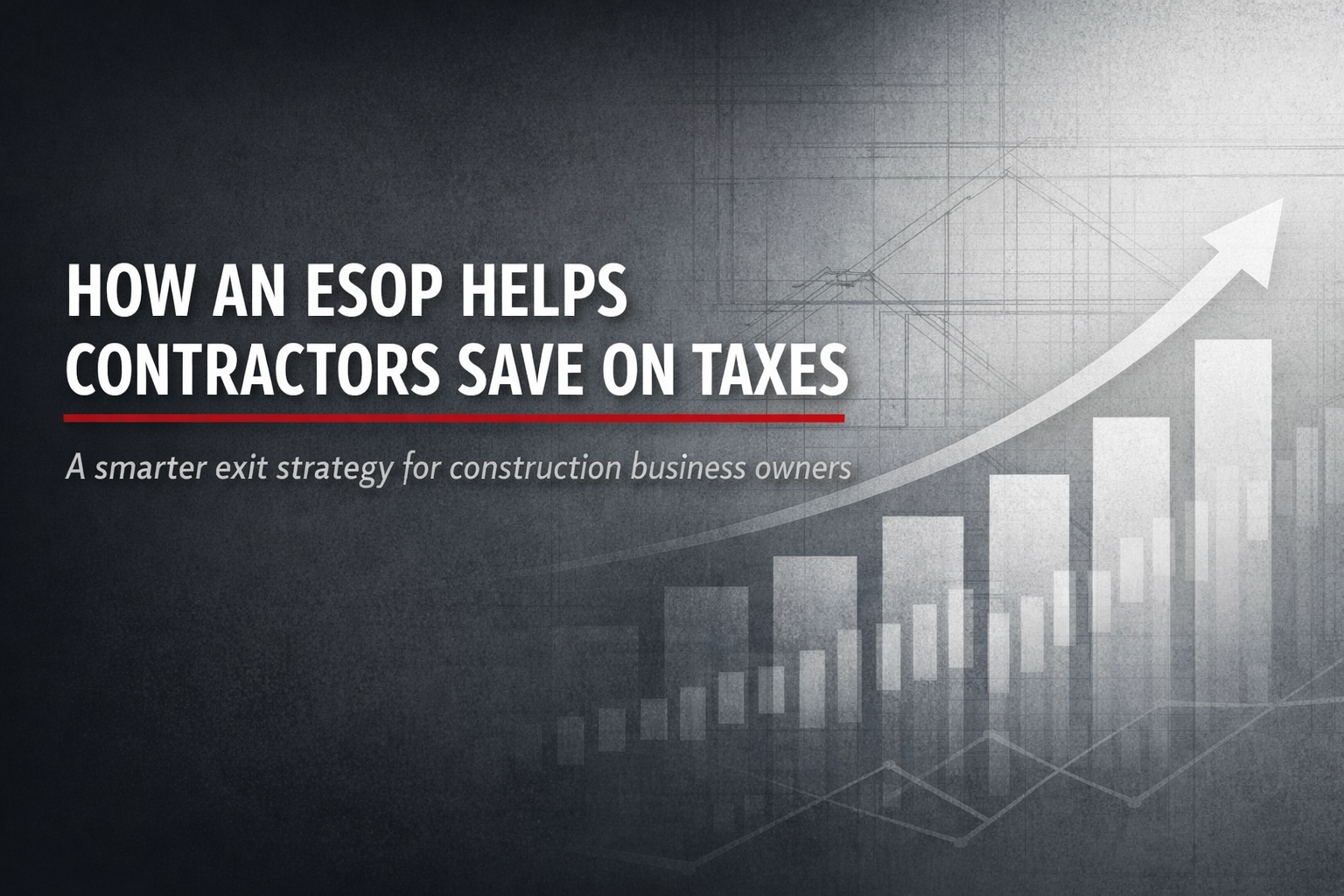Building Long-term Value in Your Contracting Business
Last Updated: 12/20/2024
Written by: Gary Gray
Understanding True Business Value
Most contractors know exactly what their equipment is worth and can calculate their project backlog down to the penny. But your business's true value goes far beyond these tangible assets. In today's market, how you structure and operate your contracting business can matter more than what you own.
The Evolution of Contractor Business Value
The elements that make a contracting business valuable have shifted dramatically. While equipment, project backlog, and client relationships remain important, new factors are increasingly driving business value.
Beyond Physical Assets
Your bonding relationship, workforce stability, and operational systems often carry more weight than your equipment fleet. Buyers and stakeholders are looking deeper into how your business will perform over time, not just what it owns today.
The Workforce Value Factor
Your team's ability to consistently deliver quality work matters more than ever. When estimators, project managers, and superintendents understand your systems and standards, they create value that goes far beyond their daily tasks.
Key Value Drivers in Modern Contracting
Operational Resilience
Your business's value increases significantly when it can maintain consistent performance regardless of market conditions or leadership changes. This means having systems and structures that don't rely solely on any individual's presence.
Sustainable Client Relationships
While personal relationships matter, institutional relationships that survive ownership transitions carry premium value. Modern contracting businesses need structures that preserve client confidence through any changes.
Bonding Strength
Your bonding capacity isn't just about current projects – it's a crucial indicator of future potential. How your business is structured can significantly impact your bonding relationship and, by extension, your company's value.
Risk Factors Affecting Value
Building Sustainable Value
System-Based Operations
Developing strong operational systems that can outlast any individual creates lasting value. This means documenting processes, standardizing procedures, and creating clear accountability structures.
Strategic Ownership Alignment
How you structure ownership can significantly impact every aspect of your business's value. Forward-thinking contractors are discovering ownership models that naturally enhance their competitive position.
Financial Structure Optimization
Your business's financial structure affects everything from bonding capacity to reinvestment ability. Modern approaches are helping contractors build stronger financial foundations while maintaining operational control.
Value Enhancement Strategies
Culture of Ownership
Creating a culture where employees think and act like owners can dramatically increase your business's value. This goes beyond profit sharing to fundamental alignment of interests.
Operational Independence
Building a business that can operate effectively without constant owner involvement increases its value significantly. This means developing leadership depth and clear operational protocols.
Market Position Strength
Protecting and enhancing your market position requires strategic thinking about ownership and operational structure. Leading contractors are finding ways to strengthen their competitive position through innovative business structures.
Protecting What You've Built
Your business represents years of hard work and relationship building. The right structure helps protect this value while creating opportunities for growth. Modern contractors are discovering approaches that:
- Enhance operational stability
- Improve financial strength
- Create natural succession paths
- Preserve key relationships
- Support sustainable growth
The Next Steps
Building lasting value in your contracting business requires thinking beyond traditional approaches. The most successful contractors are those who take proactive steps to structure their businesses for long-term success while protecting what they've built today.
Connect with our team to learn how leading contractors are building and protecting lasting business value.
How to get started
Getting started with an Employee Stock Ownership Plan (ESOP) can transform your contracting business, unlocking potential for growth and ensuring lasting value for everyone involved. At ESOP for Contractors, we understand the intricacies of the process, from assessing your company's current status to designing a tailored ESOP that aligns with your goals. Our leadership team knows firsthand how to create winning strategies that benefit both owners and team members alike. If you're curious about how an ESOP could enhance your business's future, we invite you to reach out for a free consultation. Let’s explore how we can help you achieve sustainable success together!
Your Point Of Contact

Gary Gray
ESOP for Contractors was founded by Gary Gray, an experienced ESOP CEO who has firsthand experience in navigating the post-transaction landscape, maximizing the value of an Employee Ownership Culture and ultimately achieving nearly 3x growth in five years following the ESOP transaction. At ESOP for Contractors, we have helped owners craft the perfect kickoff message to announce the new business structure, facilitated the formation of effective boards with independent directors, provided the quick resource to answering the tactical questions that quickly emerge in the new ESOP environment and successfully executed succession plans on the selling shareholders' timeline.
Book a Free Consultation
Interested in a free consultation for your contracting business? Send us a message - We’re here to help.
ESOP FAQ's
What is an ESOP?
An ESOP is a qualified retire plan that invests solely in the stock of the sponsoring company. Over time, employees accumulate shares, which they can cash out upon retirement, departure, or under other circumstances defined by the plan.
How does an ESOP work?
- Formation of the ESOP Trust: A company sets up an ESOP trust, which will purchase the shares on behalf of employees. The company typically funds this trust through future earnings.
- Financing the ESOP: The ESOP trust can buy shares solely through future earnings or by borrowing money. The company then repays the loan, with tax-deductible contributions, over time.
- Allocation to Employees: Shares in the ESOP trust are allocated to individual employee accounts, based on total employee compensation.
- Vesting Schedule: Employees earn the right to the shares over a vesting period, which can range from three to six years or more, incentivizing them to stay with the company.
- Exit and Distribution: When employees leave the company, retire, or otherwise separate, the company buys their shares back at fair market value, providing them with a significant retirement benefit.
Why should I consider an ESOP for my business?
- Succession Planning: ESOPs provide an orderly and flexible exit strategy for business owners who want to retire without selling to outside buyers.
- Tax Advantages: ESOPs offer substantial tax benefits. Contributions used to repay the ESOP loan are tax-deductible, and owners selling to an ESOP in a C corporation can defer capital gains taxes under certain conditions. An S-Corp ESOP structure offers substantial tax advantages, including the ability to eliminate or greatly reduce federal income taxes, make deductible contributions to the ESOP, and potentially defer capital gains tax on stock sales through certain strategies.
- Employee Motivation and Retention: ESOPs can boost employee morale, productivity, and loyalty because employees have a direct stake in the company’s success.
- Preservation of Company Culture: Selling to an ESOP ensures that the business remains in the hands of those who understand and value its culture, which is often a key concern for founders.
- Access to Financing: ESOP-owned companies may have better access to financing due to tax advantages, which improve cash flow and make loan repayment more manageable.
What's the role of consultants for an ESOP?
Determining if an ESOP is a Good Fit
- Initial Feasibility Analysis: Consultants will conduct a feasibility study to determine if an ESOP is viable for the business. This includes reviewing the company's financial health, valuation, and assessing the impact on cash flow.
- Understanding Objectives: Consultants work closely with business owners to understand their goals, whether they are focused on succession planning, employee engagement, or tax efficiency.
- Employee and Cultural Fit Assessment: Consultants evaluate if the company's culture and employee base are well-suited for an ESOP. Employee education and buy-in are critical for ESOP success.
Setting Up the ESOP
- Structuring the ESOP: Consultants help design the ESOP structure, including defining eligibility, vesting schedules, and financing methods.
- Valuation and Financing: Consultants coordinate the valuation of the company’s stock and arrange financing options if the ESOP requires external funding, such as bank loans or seller financing.
- Legal and Compliance Guidance: Setting up an ESOP involves navigating complex legal landscapes. Consultants work with legal advisors to draft the ESOP plan documents and ensure compliance with regulations.
- Communication and Employee Education: Consultants help communicate the ESOP to employees, explaining how it works and the benefits, fostering a sense of ownership and engagement.
- Ongoing Management and Monitoring: After the ESOP is established, consultants can assist with ongoing administration, including annual valuations, compliance checks, and managing the repurchase obligation.















